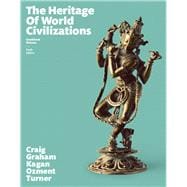NOTE: You are purchasing a standalone product; MyHistoryLab does not come packaged with this content. If you would like to purchase both the physical text and MyHistoryLab, search for 0134224922 / 9780134224923 T he Heritage of World Civilizations, Combined Volume plus MyHistoryLab for World History — Access Card Package, 10/e
Package consists of:
• 0133834913 / 9780133834918 The Heritage of World Civilizations, Combined Volume, 10/e
• 0133861880 / 9780133861884 MyHistoryLab for World History Valuepack Access Card
MyHistoryLab should only be purchased when required by an instructor.
For courses in World History
A comparative, global approach to world civilizations
The Heritage of World Civilizations provides an accessible overview of Asian, African, Middle Eastern, European, and American civilizations with an emphasis on the role played by the world's great religious and philosophical traditions throughout history. Leading scholars in their respective fields, the authors empower students to view the events and processes that have shaped our increasingly interdependent world through a comparative, global lens.
Also available with MyHistoryLab®
MyHistoryLab for the World History course extends learning online, engaging students and improving results. Media resources with assignments bring concepts to life, and offer students opportunities to practice applying what they’ve learned. And Writing Space helps educators develop and assess concept mastery and critical thinking through writing, quickly and easily. Please note: this version of MyHistoryLab does not include an eText.
The Heritage of World Civilizations, Tenth Edition is also available via REVEL™, an immersive learning experience designed for the way today's students read, think, and learn.






